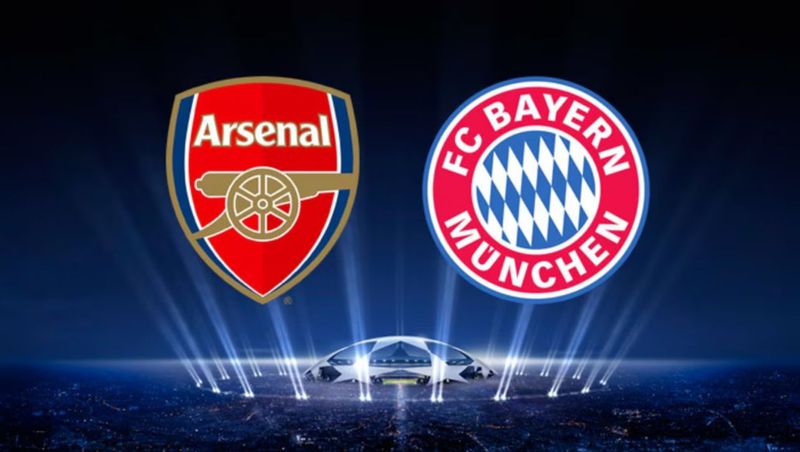
Of all the ways to lose a football match, the counter-attack is perhaps the most brutal, as it is a sucker punch. It’s a lightning strike that comes from a position of your own strength. One moment, your team is on the front foot, pressing, probing, believing the equalizer is just one more pass away. The next, the ball is in your net, and the air has been sucked from the entire stadium. This is the story of one such goal, which didn’t just change a game, but killed a tie. This is the anatomy of the 12-second goal that saw Bayern Munich knock Arsenal out of the Champions League.
For context, the two-legged quarter-final was perfectly poised, as when the first leg at the Emirates had finished 2-2. At the Allianz Arena for the second leg, the score was 1-1. Arsenal, under immense pressure, were having their best spell of the game. They were pushing. They were in possession. A corner was won. For the travelling fans, hope flickered.
This was it. This was the moment. Little did they know, Bayern manager Thomas Tuchel had set a trap, and Arsenal were about to stumble right into it. Once you know all these insider instances, you can use them to your advantage at Woo Casino and win big real-life rewards!
The Setup: A Trap is Sprung
The stage was set in the 63rd minute. Arsenal forced a corner. The ball went out of play. In these moments, most players are thinking about the attack. Strikers are jostling for position, midfielders are lining up on the edge of the box, but Bayern, and specifically their veteran striker, were thinking about something else entirely.
The Tuchel Blueprint
Thomas Tuchel is a master tactician, a coach who thrives on pre-planned moves and structural discipline, and knew that Arsenal would commit men forward for the corner. He knew the space would be left behind, and his instruction was simple: if we win the ball, get it to the fastest player on the pitch, immediately. No hesitation. No extra touches. The entire plan was a coiled spring, waiting for the trigger.
Meanwhile, on the Arsenal side, the mentality was one of attack, as they were chasing a goal to level the tie, and saw the corner as a golden opportunity. This divergence in mindset (one team thinking of scoring, the other of exploiting the aftermath of a missed chance) created the perfect conditions for a footballing ambush.
The Execution: 12 Seconds of Chaos
The clock starts the moment the Arsenal corner is taken. What follows is a masterclass in ruthless efficiency.
- Second 1-3: The corner kick is swung in. It’s a poor delivery, failing to clear the first man at the near post. Bayern defender Matthijs de Ligt meets it with a powerful, clearing header. The ball soars out of the penalty area. The trap is sprung.
- Second 4-5: The ball lands at the feet of Jamal Musiala. He is under pressure. He has one job: release the ball forward. He doesn’t try to turn. He doesn’t attempt a difficult pass. He simply lays it off to the onrushing Leon Goretzka. This first-time pass is critical. It maintains the momentum of the counter-attack and bypasses the first wave of retreating Arsenal players.
- Second 6-8: Goretzka takes one touch. Just one. He looks up and sees a blur of white streaking through the centre of the pitch. It’s Harry Kane. But note Goretzka’s genius. He doesn’t play the ball directly to Kane’s feet. He plays a perfectly weighted, first-time pass into the space behind the Arsenal defence, knowing the runner is already at full speed. This pass cuts out the entire midfield and defence in one go.
- Second 9-10: The runner is not Kane. It’s the jet-heeled Alphonso Davies, who has exploded from the left-back position. This is the killer detail. Arsenal’s defence, scrambling back, is drawn to the iconic figure of Kane. They don’t account for the overlapping run from deep. Davies is now in acres of space, with only Gabriel desperately trying to close him down.
- Second 11-12: Davies enters the box, feints to shoot, cuts inside onto his stronger right foot, and unleashes a curling, unstoppable shot into the far corner of the net as the ball ripples the net. Silence from the Arsenal end. Bedlam from the Bayern fans. Tie over.
The Aftermath: Why This Goal Killed the Tie
Until that moment, Arsenal believed that they had weathered an early storm, conceded a goal, but were now applying sustained pressure. The momentum was with them, and a 1-1 scoreline with 25 minutes to play is a nerve-shredding, but very much alive, situation. This goal changed everything. It made their task feel impossible.
The score exposed a fatal flaw in their approach at the highest level: game management. The desire to score is paramount, but at 1-1 in a finely balanced European away tie, the risk must be calculated. Committing so many players to a corner, with no cover for the speed of Davies and the vision of Goretzka and Kane, was a tactical naivety that Bayern were waiting to punish.








